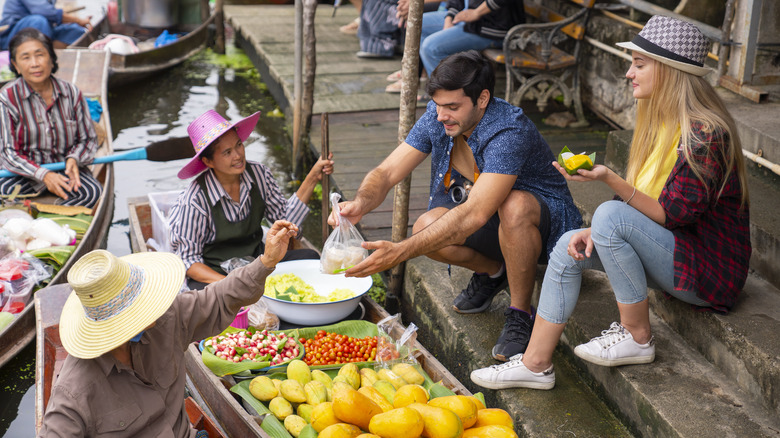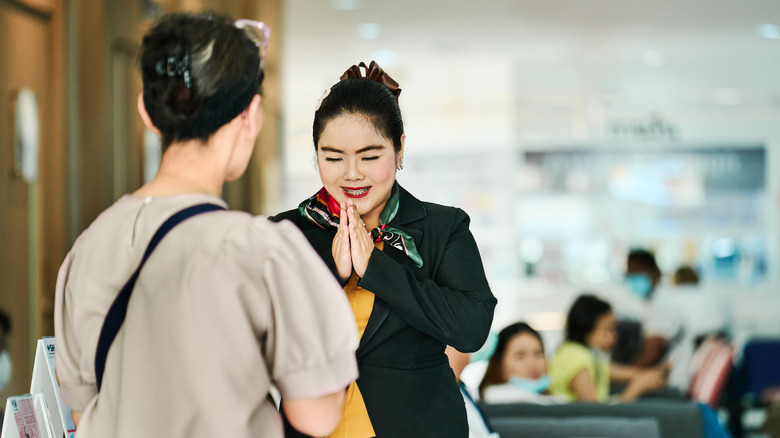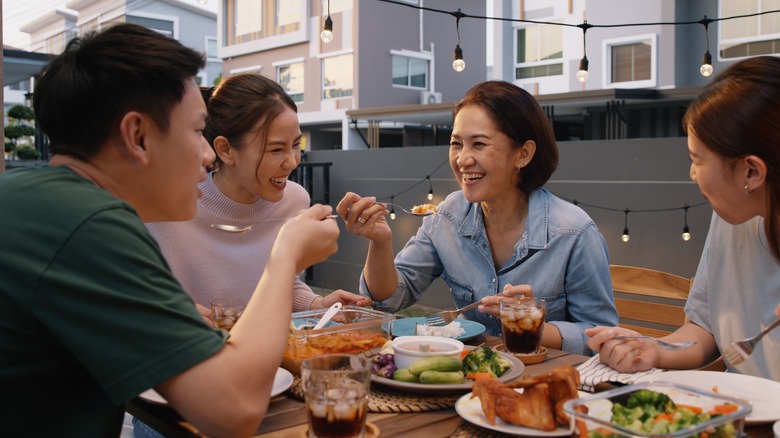Unexpected Customs Tourists Should Know Before Visiting Thailand For The First Time
If you have your first visit to the fascinating country of Thailand booked, prepare for a world of unexpected customs that you may have never witnessed before. In case your home country is on the other side of the world and primarily Western-influenced, you can expect to experience a little healthy culture shock. Being aware of a few native customs will start you off on the right foot when you arrive in Thailand — and some of these are going to surprise you.
One of the most traditional hand gestures unique to Thailand is the "wai," an everyday gesture of goodwill and gratitude, and you can expect to witness and use this frequently. The wai is performed by pressing your palms together at chest-level as in prayer and slightly bowing your head towards the other person. Thai people offer the wai as hello and goodbye, in apology, and in gratitude. While it is not strictly expected of tourists, it is very encouraged and appreciated to reciprocate this gesture when communicating with locals.
There is no better way to start off a positive interaction in Thailand than with a wai. If locals offer it to you, they will be pleased to see a foreigner reciprocating their friendliness. Since the wai is a sign of respect, it isn't necessary to wai in all situations, such as in the checkout line at 7-Eleven or to your waiter as you leave the restaurant. In those cases, a bow of the head and smile is sufficient. The higher someone's hands go when performing the wai, the more respect offered; that is why you may see the wai performed at nearly forehead level to certain individuals such as monks or the elderly.
Hospitality and friendliness is the backbone of Thai interactions
One of the first thoughts that will likely strike you when you arrive in Thailand is: Why is everyone smiling so much here? In the Land of Smiles, you will be pleasantly surprised at how courteous and hospitable Thai people are, both to each other and to foreigners. Being on your best behavior is more appreciated and reciprocated here than in many other popular travel destinations. Thai people are very socially aware, friendly, and respectful, and it's considered important to treat others with warmth and respect. Westerners often find that they've been shown a lesson in manners.
For example, locals bow their heads as a sign of respect, and nodding is a sign of acknowledgement (even if they don't understand what you said). Direct eye contact is usually avoided because it can come across as aggressive and disrespectful. When you pass someone and you're taller, it's common to bow your head slightly to show you don't consider yourself superior. It's also discouraged to point at people. Generally, Thai people use few dramatic hand gestures when communicating, as they could be misinterpreted negatively, but of course, one primary exception is the wai.
One of the most unique customs in Thailand is the act of taking off your shoes before entering shops, temples, and private homes. This is a sign of respect when entering someone else's space and also a practical effort to keep floors clean and dirt outside. Sandals are commonly worn, which eases the practice of slipping off your shoes, and you'll see piles of shoes in front of doorways. When entering a building, it's best to assume you'll be taking off your shoes, but if you're unsure whether it's necessary, it is polite to poke your head inside and ask the storeowner. Exceptions are hotels and most restaurants.
Thailand cherishes respect and conservative traditions
You will find attire in Thailand to be modest and conservative; it is considered impolite and inappropriate to wear certain clothing that shows too much skin, so be cautious of the clothing you pack on a trip to Thailand. You won't see the locals flaunting cropped tank tops or skimpy shorts. As a tourist, save your swimsuits for the beach, and wear a T-shirt or cover-up once you're back in public. It is best to wear pants, knee-length skirts, and shirts with sleeves covering your shoulders. To combat the hot temperatures (because we know it gets hot), opt for lightweight and linen materials, and this will keep you cool while also keeping your clothing appropriate.
The royal family is shown a great deal of respect and deference in Thailand. They are not spoken poorly of, not even in jest, and tourists should definitely follow suit. Monks also hold a highly respected place in society. Buddhism is widely practiced, and hopefully, you make time to visit the incredible wats (temples) that Thailand is famous for. When at the temples, you should go out of your way to show respect by speaking quietly, taking off your shoes, and dressing modestly (no exposed shoulders, and no shorts or skirts above the knee). It's a treasure to be able to observe and experience these unique traditions of Thailand for yourself — unexpected in all the best ways!


